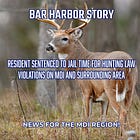The Bar Harbor Story is generously sponsored by Andy’s Home Improvement Inc.
MOUNT DESERT—Maine House Minority Leader Billy Bob Faulkingham (R-Winter Harbor) presented a bill, LD 1438, to the Committee on Inland Fisheries and Wildlife on April 3, that would make it legal to hunt deer on Mount Desert Island.
Representative Faulkingham represents the towns of Franklin, Gouldsboro, Hancock, Sorrento, Sullivan, Winter Harbor, and Steuben.
The bill, cosponsored by Richard Mason (R-Lisbon), James Thorne (R-Carmel), and David Woodsome of (R-Waterboro) consists of one short section. “Mount Desert Island deer hunting rulemaking. Resolved: That the Commissioner of Inland Fisheries and Wildlife shall adopt rules opening Mount Desert Island to deer hunting in accordance with the Maine Revised Statutes, Title 12, section 11402, subsection 4.”
It also contains a summary of substantially the same language. “This resolve directs the Commissioner of Inland Fisheries and Wildlife to adopt rules opening Mount Desert Island to deer hunting in accordance with the Maine Revised Statutes, Title 12, section 11402, subsection 4.”
Nuisance or Nature
There has long been differing opinions regarding the deer population on Mount Desert Island with some considering the abundance a nuisance or danger and some enjoying the relative easy of seeing deer, from fawns to heavily antlered “trophy” bucks.
Deer haven’t been legally hunted on the island since the 1930s except when it has been declared a “nuisance” deer situation.
As recently as this past December, the Southwest Harbor Select Board was considering what it could do—if anything—to help decrease the amount of accidents involving deer as well as potentially decrease the amount of property damage deer might cause as well as Lyme disease cases on MDI.
At its December 10 meeting, the board members discussed a potential deer ordinance related to people feeding deer in Southwest Harbor and how the problem is a bit bigger than the one town.
In a 2020 report to the 129th Maine legislature, wildlife biologist Nathan R. Bieber wrote, “The extent to which deer are fed in Maine is not fully known, but Maine’s deer feeding culture appears to be more extensive than what’s seen in other Northeastern states, perhaps owing to relatively severe winters. It is generally agreed upon that feeding is prevalent south to north but that the scale of feeding varies regionally. Southern Maine is believed to consist of predominantly small backyard feeding sites, and while northern Maine has these as well, deer feeding is occasionally much larger in scale and much more organized in northern Maine.”
Deer also have had an impact on other species. Bar Harbor was the first place in Maine where a deer tick was found. That was in the 1980s. There can be up to 100 ticks on a single deer at any given time. Deer ticks are successful in broadleaf forest. Because of the fire of 1947, MDI has large tracts of broadleaf woods creating that habitat.
The College of the Atlantic has a 2013 report on successful thinning of MDI’s deer herd in the past online.
“A lot about MDI has changed in the past 150 years: by 1870, decades after people began coming to the island in earnest, most of the island’s first growth forest was gone,” wrote Erickson Smith, Christopher Phillips, and Anneke Hart in the 26-page document. “Those who settled Mount Desert Island created a landscape of small farms and industries much like the rest of New England. 47% of the Island’s acreage was classified as ‘improved’ in government records, meaning it had been put to human use and not left as forest. In many ways, this creation of a landscape of ‘edges’ (transition zones between different landscape features) was the beginning of a long history of human/deer interaction, as the improvements humans made to the land created ideal habitat for deer.”
In 2013, 1,376 probable and confirmed cases of Lyme disease were reported to Maine CDC. The latest year with data is 2021 and that number had increased to 1,510 cases, which was a 34% increase from the year before. Cases had decreased significantly in 2020. Hancock County had a higher infection rate than most of the rest of the state in 2021.
Back in 2013, a task force studied how Lyme disease had increased on Mount Desert Island by a factor of four since 2006. Similarly, there was a doubling of deer and vehicle accidents compared to numbers in the early 2000s and 1990s.
At the time, the task force chairman Robert Kelley reported that 20% of all accidents on MDI involved deer. Those events aren’t contained to any town or Acadia National Park. Back in 2013-2014, the task force studied data and hunting methods since the park bans deer hunting. The goal had been to create a phased hunting proposal to reduce the herd population to a density of 10-15 every square mile.
Discussions about potentially thinning down the herd brought standing room only crowds to the Bar Harbor Town Council Chambers.
State data on trends in deer-vehicle accidents don’t seem to be increasing much anywhere on Mount Desert Island other than Tremont. Tremont has had 15 accidents with deer involved last year; the town had seven the year before and six in 2013. The total number of accidents in each year are 15 in 2013, 16 in 2023, and 20 in 2024.
Southwest Harbor’s number of car and deer accidents have gone down from 14 in 2023 to 6 in 2024. In 2013 there were only 3. The total number of accidents in each year are 29 in 2013, 36 in 2023, and 22 in 2024. Some of that data might be a bit askew because of how the town has been declaring incidents clear or not.
Bar Harbor’s numbers for all accidents is much higher. The total number of accidents in each year are 141 in 2013, 175 in 2023, and 157 in 2024. Deer involvement numbers were 26 in 2024, 31 in 2023, and 22 back in 2013.
Mount Desert had 19 deer-related accidents in 2024 and 2023. Back in 2013, the town had 21.
Easy Hunting
The Maine Warden Service has recently released details about poaching on Mount Desert Island, which is related to the arrest of a Bar Harbor man, Benjamin Hamor, 51, who wasn’t working alone, which was reported on today by the Bangor Daily News.
Deer hunting is not allowed on Mount Desert Island. It is illegal on federal land, which is Acadia National Park’s 30,500 acres, a significant land mass on the 108 square miles of the island (69,120 acres). The state has also made it illegal on private lands across the island.
This past fall, the state offered $4,000 as a reward for information about two deer that had been shot. One was in Tremont in November, the other was killed the month before in Mount Desert. That investigation is ongoing.
On Facebook in early April, the Maine Warden Service posted, “This was not a case of a mistake made by a responsible hunter. It was deliberate poaching.”
According to the post, a community member had believed that a deer was killed illegally and called the warden.
“It’s a rewarding feeling when you dive into a case like this and can be the voice for wildlife,” said Warden Camden Akins. “Wildlife can’t call and ask for help when someone is taking advantage of our natural resources. That’s why it’s so important when members of the public speak up, we can step in and protect the wildlife we all cherish.”
Hamor has to pay more than $11,000 in fines and he spent 30 days in jail. The other men, who pled guilty, received fines of less than $1,000 and no jail time. Those charged were Mark Cross, 73, of Mount Desert; Bruce Hamor, 75, of Bar Harbor; Adam McLaughlin, 38, of Orrington; and Benjamin Sukel, 38, of Lamoine.
According to court documents obtained by the Bangor Daily News’ Bill Trotter, Bruce Hamor, Sukel, and Cross plead to one charge each of either possessing an unregistered deer or unlawfully possessing a harvested animal. All of this occurred in late 2020 and early 2021. The resolution for McLaughlin’s case is not currently known.
An email request for comment to Representative Faulkingham was not responded to by press time.
We clarified that “hunting” refers to only deer hunting throughout this story.
Links to Learn More
Follow us on Facebook. And as a reminder, you can easily view all our past stories and press releases here.
If you’d like to donate to help support us, you can, but no pressure! Just click here (about how you can give) or here (a direct link), which is the same as the button below.
If you’d like to sponsor the Bar Harbor Story, you can! Learn more here.









Why are representatives making decisions about towns they don't represent? Deer are a problem, and are certainly more visible in towns, not from over population, but most likely from direct and/or incidental feeding. Deer ticks and Lyme disease are huge concerns, but ticks are also transported on migratory birds, mice and other small mammals. I am not against an occasional culling of the MDI herds, but only if there is data of an over population. But an all out hunting season on MDI? That is problematic. Finding a legal area to hunt on MDI that also follows Maines firearms discharge rules would be difficult. And what would it really accomplish? Coyotes and the temptation of tasty foods push deer out of the park, and hunting would push them back in. Faulkingham should worry about the towns he was elected to represent and leave MDI out of it.
As all other managed species are legal to be hunted outside of the park boundaries there are viable legal options to reduce the herd via controlled land owner depredation hunts or inclusion into the expanded archery hunt program.